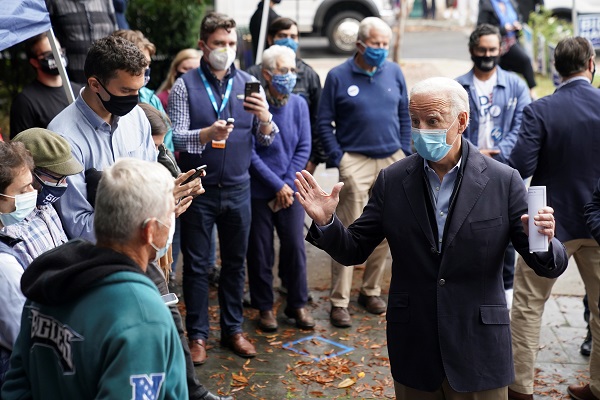Blog November 13, 2020
Biden’s Message of Unity is Welcomed by Most Americans

In his acceptance speech, President elect Joe Biden declared that, ‘It’s time to put away the harsh rhetoric, lower the temperature, see each other again, listen to each other again. And to make progress we have to stop treating our opponents as enemies.”
Biden’s desire to move past the divisiveness that has marked the Trump presidency, the question that follows is simple: Are Americans actually open to working with others and trying to find the middle ground?
Data from AEI’s Survey Center for American Life – which was collected right before the election – suggests that most Americans believe common ground can be found, though those on the extremes and the minority of the citizenry are less optimistic.
For instance, a nationally representative sample of thousands of Americans were asked if they believe that it was possible to compromise and find common ground with people who disagree with you, and collectively 79 percent of Americans believe that common ground can be found, compared to just 19 percent who feel agreement is simply not possible.
Eighty-four percent of Americans who state that they are ideologically moderate or lean liberal or conservative believe that compromise can be found. Forty-two percent of Americans fall into this group. Respondents who state that they haven’t given much thought to their ideology are lower at 76 percent believing that common ground can be found.
The number of Americans who believe that they can find common ground with others slips a bit for liberals at 79 percent and conservatives at 73 percent, but these are both overwhelming majorities of their respective groups.
The fact of the matter is that the overwhelming majority of Americans are entering the Biden era with considerable optimism and openness to compromise. This forward thinking is consistent across many facets of the polity from geographic region to race and ethnicity. There is even little generational difference despite the fact that older cohorts of Americans tend to be more entrenched on preferences compared to younger cohorts. Eighty-one percent of both those in Gen Z and their parents, the Baby Boomers, hold that compromise can be found and no other cohort is more than a few points off the national average.
This all is in line with decades of earlier research which has found that most Americans are thoughtful and reasonable and are regularly subjected to extreme rhetoric and face polarized choices which are the consequence of an extreme and engaged political elite. The percentage of Americans who are interested in continued partisan one-upmanship at the expense of making progress on our most serious problem represent a small slice of the electorate. However, both Democrats and Republicans are somewhat more interested in the other side compromising than their own.
Fortunately, most Americans are open to working together to compromise and find common ground with those they disagree with. Donald Trump’s narrative was the antithesis of what deliberative democracy should be and instead opted to demonize others; President Biden’s more hopeful and collective approach may have some real currency.








